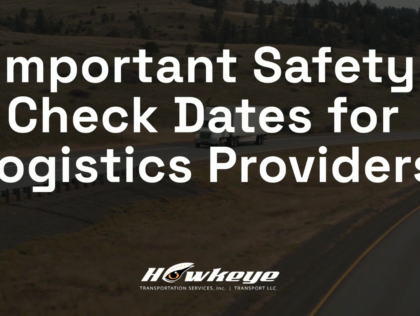Feds Investigate Wording of Lease Agreements
The U.S. Department of Transportation (DOT) has appointed a task force to examine the maintenance provisions in lease-purchase agreements. Investigators are concerned that the provisions could support a predatory revenue source for motor carriers who lease to owner-operators.
The task force believes the contract agreements may hinder owner-operators’ attempts to pay for maintenance on vehicles they purchase or lease from motor carriers.
DOT regulators asked the task force to look for inequitable terms in motor-carrier industry leasing agreements that could “affect the frequency and quality of maintenance performed on subjected vehicles.”
Previously, a study by a U.S. government financial consumer group found that there is a widespread risk of truckers being unaware of the costs they are agreeing to in hastily signed lease-purchase agreements.
Attorney Paul Cullen is a task-force member. He says that the problem “is not necessarily always the language of the agreements themselves,” but rather that the problems that occur “also are with the motor carriers or the leasing companies’ failure to abide by the agreements.”
Jim Jefferson of the Owner-Operator Independent Drivers Association points out that some contracts mandate that the lease-purchaser is responsible for virtually everything—all maintenance, repairs, upkeep, and service.
The group members say younger, less experienced truckers are particularly vulnerable to signing agreements they don’t entirely understand. They may not have a clear idea of the type and amount of expenses that will be docked from their pay, or that they’re responsible for maintenance fees.
In a statement, the American Trucking Association warned against painting lease-purchase agreements with too broad a brush. ATA Vice President of Workforce Policy Nathan Mehrens said the organization “believes that unscrupulous actors in our industry should be addressed, but painting all lease agreements as deceptive or worse is simply an inaccurate picture of industry business practices. Efforts to root out deceitful lease agreements should not preclude carriers and drivers from entering into arrangements that preserve individuals’ opportunities to pursue their careers in the manner they choose.”
Trucking Industry and Economy Looking Good
Shipments were down in 2023 and many carriers are exiting the business. However, the outlook for the economy and logistics industry are good for 2024. The transportation market and logistics industry are on the upswing, with trucking demand growing and capacity lower compared to early 2023.
Economic demand for goods seems to have grown, based on tender volumes averaging more than 10% higher from late 2022 to December 2023 and daily tender volumes moving higher past October. Colorado State’s Zac Rogers, associate professor of supply chain management, believes the booming demand is the result of both inventories being rightsized compared to last year as well as growing consumption.
The Logistics Managers’ Index (LMI) has yielded some remarkable data concerning respondents’ outlook on transportation prices. The LMI contains measures of logistics activity such as transportation and warehousing prices and capacity. Numbers over 50 indicate expansion. Values under 50 indicate contraction. Whereas the 2023 transportation pricing component averaged 38, the November survey revealed a reading around 64 for prices in 2024. This shows most respondents believe rates have bottomed.
The data suggests the supply of capacity and demand for its use is quickly approaching equilibrium. Past Carrier Details Total Trucking Authorities data shows this is a historically strong downward trend.
Some experts feel there will be growing risk for shippers in 2024 and overly aggressive cost-cutting could be ill-advised compared to 2023.
There is still some uncertainty, but the American economy has undeniably been consistently performing above expectations, and a growing number of observers think a recession is not in the cards and a soft landing is likely.
SOURCES:
https://www.ttnews.com/articles/dot-lease-agreements
https://www.freightwaves.com/news/truckload-supply-and-demand-on-collision-course-in-2024



